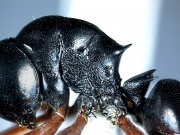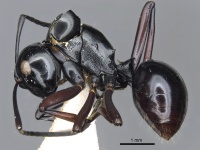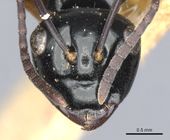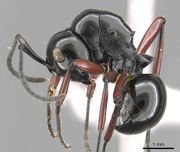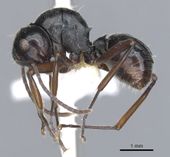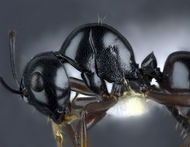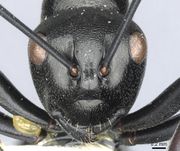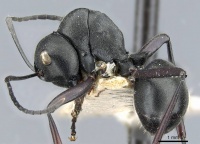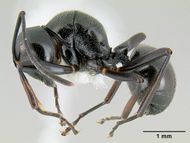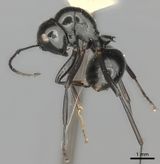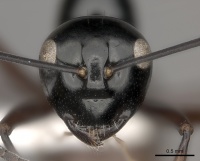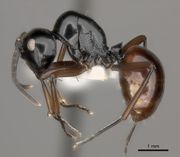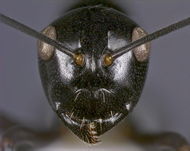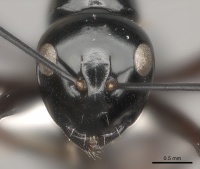Key to New Guinea Polyrhachis Cyrtomyrma
This worker key is based on: Kohout, R. J. 2006b. Review of Polyrhachis (Cyrtomyrma) Forel (Hymenoptera: Formicidae: Formicinae) of Australia, Borneo, New Guinea and the Solomon Islands with descriptions of new species. Memoirs of the Queensland Museum. 52:87-146.
You may also be interested in
1
- Pronotal humeri in dorsal view toothed, obtusely angular, or narrowly rounded; greatest width of pronotal dorsum across, or just behind shoulders . . . . . 2
- Pronotal humeri in dorsal view widely rounded; greatest width of pronotal dorsum at about mid-length of segment . . . . . 10
2
return to couplet #1
- Propodeum armed with a pair of more-or-less distinct spines . . . . . 3
- Propodeum totally unarmed . . . . . 7
3
return to couplet #2
- Pronotal humeri bilobed or produced into prominent teeth . . . . . 4
- Pronotal shoulders angular or narrowly rounded . . . . . 5
4
return to couplet #3
- Propodeal spines long, dorso-ventrally compressed, widely diverging and bluntly terminated (Aru Is) . . . . . Polyrhachis levior
- Propodeal spines very short, upturned and acute . . . . . Polyrhachis albertisi
5
return to couplet #3
- Propodeal spines long, dorsoventrally compressed, widely diverging and bluntly terminated; lateral petiolar spines distinctly longer than dorsal pair . . . . . Polyrhachis barryi (in part - also #15)
- Propodeal spines short, acute, strongly upturned . . . . . 6
6
return to couplet #5
- Larger species (HL >1.68) . . . . . Polyrhachis linae
- Smaller species (HL 1.56) . . . . . Polyrhachis mondoi
7
return to couplet #2
- Pronotal shoulders produced into prominent teeth (Aru Is) . . . . . Polyrhachis aruensis
- Pronotal shouders angular or narrowly rounded . . . . . 8
8
return to couplet #7
- Larger species (HL 2.09); head very broad with eyes rather flat, in full face view not reaching lateral cephalic outline (Bismarck Archipelago) . . . . . Polyrhachis ralumensis
- Smaller species (HL <1.76); eyes convex, in full face view clearly extending beyond lateral cephalic outline . . . . . 9
9
return to couplet #8
- Pronotal dorsum with anterior face distinctly convex in profile; propodeal declivity oblique; legs orange or light red . . . . . Polyrhachis rastellata
- Pronotal dorsum with anterior face almost straight in profile; propodeal declivity virtually vertical; legs very dark reddish-brown . . . . . Polyrhachis strumosa
10
return to couplet #1
- Propodeum armed with a pair of more-or-less distinct spines or tubercles . . . . . . 11
- Propodeum totally unarmed . . . . . 17
11
return to couplet #10
- Pronotal dorsum in profile elevated, distinctly convex . . . . . 12
- Pronotal dorsum only weakly convex or flat . . . . . 13
12
return to couplet #11
- Lateral petiolar spines distinctly elongated; summit of pronotal dorsum only marginally higher than dorsum of mesonotum (Seram I.) . . . . . Polyrhachis goramensis
- Lateral petiolar spines very short, rudimentary; summit of pronotal dorsum distinctly higher than dorsum of mesonotum . . . . . Polyrhachis integra
13
return to couplet #11
- Larger species (HL >1.55) . . . . . 14
- Smaller species (HL <1.50) . . . . . . 16
14
return to couplet #13
- Propodeal spines well developed, dorso-ventrally compressed; pronotal humeri rounded, weakly subangular . . . . . 15
- Propodeal spines rudimentary or present only as distinct tuberculae; pronotal humeri evenly rounded; petiole strongly transverse with dorsal spines reduced to minute denticles, lateral spines slender, widely diverging . . . . . Polyrhachis wagneri
15
return to couplet #14
- Petiole with spines more-or-less subequal; propodeal spines short, strongly upturned (Bismarck Archipelago) . . . . . Polyrhachis leonidas
- Petiole with lateral spines distinctly longer than dorsal spines; propodeal spines long, only weakly upturned . . . . . . Polyrhachis barryi (in part - also #5)
16
return to couplet #13
- Body covered with abundant appressed and decumbent hair; propodeal spines short, upturned; lateral petiolar spines long, slender . . . . . Polyrhachis inducta
- Body with only sparse appressed hair; propodeal spines very short or present as mere denticles or tuberculae; petiolar spines subequal . . . . . Polyrhachis debilis
17
return to couplet #10
- Petiole virtually parallel-sided; petiolar spines very short, rudimentary . . . . . Polyrhachis brevinoda
- Petiole with sides dorsally diverging; petiolar spines of various configurtions, well developed . . . . . 18
18
return to couplet #17
- Head, mesosoma and petiole distinctly, closely reticulate-punctate, opaque . . . . . 19
- Head, mesosoma, petiole and gaster very finely shagreened, rather smooth . . . . . 20
19
return to couplet #18
- Pronotal dorsum distinctly swollen, exceptionally high, with medially impressed longitudinal furrow along summit . . . . . Polyrhachis inflata
- Pronotal dorsum not distinctly swollen, without longitudinal furrow on summit . . . . . Polyrhachis luctuosa
20
return to couplet #18
- Petiole with pair of long, slender, outward- and backward-directed lateral spines, dorsal pair reduced to minute denticles; body surfaces smooth and highly polished . . . . . Polyrhachis sedlaceki
- Petiole with lateral spines only marginally longer than dorsal pair or all spines subequal in length . . . . . 21
21
return to couplet #20
- Body with numerous appressed and decumbent hairs . . . . . . . . . . 22
- Body with only very sparse, short appressed hairs . . . . . 23
22
return to couplet #21
- Larger species (HL>1.47); lateral petiolar spines distinctly longer than dorsal pair; body pubescence rather diluted (New Guinea) . . . . . Polyrhachis nomo
- Smaller species (HL<1.40); petiolar spines subequal; body pubescence abundant (Australia, Papua) . . . . . Polyrhachis decumbens
23
return to couplet #21
- Mesosomal dorsum in profile with evenly convex outline . . . . . Polyrhachis euryala
- Mesosomal dorsum in profile with distinctly uneven outline . . . . . 24
24
return to couplet #23
- Propodeal declivity oblique . . . . . 25
- Propodeal declivity virtually vertical . . . . . 27
25
return to couplet #24
- Pronotal dorsum exceptionally high, with short, medially impressed longitudinal furrow . . . . . . Polyrhachis conspicua
- Pronotal dorsum not exceptionally high, longitudinal furrow lacking . . . . . 26
26
return to couplet #25
- Anterior face of pronotal dorsum ascending towards rather short summit in very weakly convex, almost straight line . . . . . Polyrhachis tuberosa
- Anterior face of pronotal dorsum ascending in strongly convex line towards distinctly swollen dorsum; pronotal-mesonotal summit relatively long . . . . . Polyrhachis dorsena
27
return to couplet #24
- Mesosoma in outline with pronotal dorsum strongly convex, rather swollen; propodeum relatively low . . . . . Polyrhachis hybosa
- Mesosoma in outline with only weakly convex, rather low pronotal dorsum and distinctly high propodeum (Bismarck Archipelago) . . . . . 28
28
return to couplet #27
- Eyes distinctly convex, clearly breaking lateral cephalic outline in full face view; propodeal declivity lower, weakly concave at base; petiole with anterior face almost straight and posterior face convex . . . . . Polyrhachis aporema
- Eyes rather flat, situated well inside cephalic outline in full face view; propodeal declivity higher, virtually vertical; petiole distinctly biconvex . . . . . Polyrhachis kyawthani





